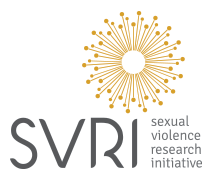
Sexual Violence Research Initiative
Global Research Consortium

Global Research Consortium
Founded in 1999 by the South African Medical Research Council, the Sexual Violence Research Initiative has become the world's leading platform for advancing evidence-based research on violence against women and children.

The Sexual Violence Research Initiative was established in 1999 at the South African Medical Research Council (SAMRC) in response to the urgent need for rigorous research on violence against women and children, particularly in the context of post-apartheid South Africa's high rates of gender-based violence.

Prof. Rachel Jewkes - Founding Director and global pioneer in violence research
SAMRC Leadership - Institutional support and commitment to addressing violence
International Partners - Early collaborations with WHO, UN Women, and academic institutions

SVRI envisions a world where evidence drives action, research capacity exists globally, and research translates into lasting policy and practice changes.
Location: South African Medical Research Council, Pretoria
Staff: 15+ dedicated researchers and coordinators
→ Meet the TeamComposition: International experts from academia, policy, and practice
Members: 12 international experts serving 3-year terms
→ Board MembersCoverage: Africa, Asia, Latin America & Caribbean, Europe/North America
Structure: Volunteer coordinators supported by SVRI Secretariat
→ Regional NetworksThe South African Medical Research Council (SAMRC) has been SVRI's institutional home since 1999, providing:
Relationship: Official collaboration since 2002
Focus: Global guidelines, RESPECT framework, multi-country studies
Relationship: Strategic partnership for global database and advocacy
Focus: Policy influence, data standardization, regional programming
Relationship: Collaboration on economic research and development programming
Focus: Cost studies, investment cases, fragile states research

SVRI's research approach is grounded in several key theoretical frameworks:
Understanding violence through multiple levels of influence:
SVRI has pioneered ethical standards for violence research, working with WHO to develop global guidelines that prioritize safety, confidentiality, and participant wellbeing.

SVRI specializes in combining quantitative and qualitative approaches to provide comprehensive understanding of violence and prevention.
Focus on how evidence-based interventions can be successfully implemented and scaled in real-world settings.
Expertise in conducting research across diverse cultural contexts while maintaining scientific rigor.
Innovative use of technology for data collection, analysis, and dissemination while maintaining safety standards.
Foundation Building
Global Expansion
Evidence to Impact
SVRI envisions a world where:
For 25 years, SVRI has brought together passionate researchers, practitioners, and advocates. Join our community and help write the next chapter of evidence-based violence prevention.

Excellence: Commitment to rigorous, high-quality research
Collaboration: Building partnerships across sectors and borders
Equity: Ensuring research benefits all communities
Innovation: Embracing new approaches and methodologies
Impact: Translating evidence into meaningful change
SVRI has received international recognition for its contributions to violence research and prevention, including partnerships with major global institutions and acknowledgment in key policy frameworks.